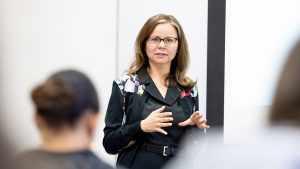
Adelphi neurolinguist looks at how healthy and impaired brains process words with multiple meanings.
Have you ever watched an aging loved one stop in the middle of a sentence and reach for a word that simply isn’t coming to them? This is called a deficit in lexical retrieval—and it’s on the rise as the American population continues to grow older. While strokes, dementia and other neurological disorders can impede the brain’s ability to retrieve the word on the tip of the tongue, Sladjana Lukic, PhD, assistant professor of communication sciences and disorders in the Adelphi University Ruth S. Ammon College of Education and Health Sciences, suspected the construction of the English language itself might play a role, too.
In an effort to shed light on impaired lexical retrieval, Dr. Lukic and collaborators from Northwestern University and the University of Maryland conducted two experiments testing the brain’s ability to correctly process and then utilize categorically ambiguous words. The team’s findings were published as “The role of category ambiguity in normal and impaired lexical processing: Can you paint without the paint?” (Frontiers in Human Neuroscience, May 2023).¹
Categorically ambiguous words, which comprise 80 percent of everyday English vocabulary, are words that can be used as either verbs (to paint) or as nouns (the paint). Critically, these words can offer a peek into the structure of neural pathways that our brains use to store, process and retrieve words. “Despite their high productivity, categorically ambiguous words have received little attention as part of the research into normal and impaired lexical processing,” Dr. Lukic said. “We wanted to know if these two different uses of paint are processed in the same way.”
The two experiments considered the base and derivative forms of categorically ambiguous nouns and verbs. The base form is the linguistic use of a word which likely formed first—for instance, something must initially constitute paint before someone can paint with it. As Dr. Lukic puts it, base forms are closer to the front of our mental filing cabinets. Derivative forms, on the other hand, are likely built online. They require greater processing costs to be retrieved by even healthy brains—an action even more difficult for people with non-fluent aphasia and other neurological conditions.
The first experiment asked 30 healthy older adults and 12 individuals with aphasia to identify when the base form of a word was a noun or a verb in both ambiguous and unambiguous words. Dr. Lukic and her team found that all healthy participants, as well as those with fluent aphasia, were able to recognize correct base forms, although they did experience longer reaction times when working with categorically ambiguous words. However, participants with more serious, non-fluent aphasia were only able to consistently recognize nouns as base forms.
The second eye-tracking experiment tracked the accurate differentiation of a derivative word form from its base by 56 healthy-brained young adults. This time, all participants experienced a reading-time slowdown for derivative forms versus their bases.
Together, results from the two experiments suggest that categorically ambiguous word forms are likely created from an existing word without any change in form, which means that access to base words will directly impact retrieval of corresponding derivatives. For people with varying degrees of aphasia, this could mean impaired access to a significant portion of their lexicon.
According to Dr. Lukic, her team’s findings hold major significance for improving assessment and treatment protocols for neurological conditions. “For patients with brain damage, we have to think about ways to turn around language loss. How can we implement something that improves someone’s ability to find a word?” Understanding how our brains store and retrieve words— and how difficult it is to access bases and their derivatives—can lead to therapies for repairing or enhancing impaired lexicons, which ultimately increases the brain’s recall efficiency.
The need for such therapies could not be more urgent, Dr. Lukic maintains. “Language is essential for human communication and for establishing social relations and human interactions. We need to show better care for our aging population and improve their quality of life. We need to give them back their lexicon.”
Biography
Sladjana Lukic, PhD
Sladjana Lukic, PhD, assistant professor of communication sciences and disorders, leads the Neurobiology of Language and Behavior Lab with a focus on two lines of research: the neurocognitive correlates of the lexical system and its relation with emotions and other cognitive systems. She also explores linguistic processes in the context of degeneration and development, investigating how language shapes cognition and emotions.
¹Lukic, S., Krauska, A., Yoshida, M., & Thompson, C. K. (2023). The role of category ambiguity in normal and impaired lexical processing: Can you paint without the paint? Frontiers in Human Neuroscience, 17. doi:10.3389/fnhum.2023.1028378